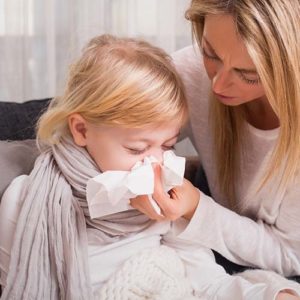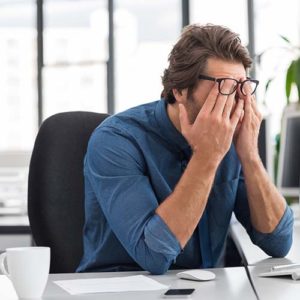“Doctor, my immune system is so weak…
I’ve caught every cold and flu this year. I’ve been sick constantly for three months and I can’t get well. Can you work up my immunity? Is there anything I can take to protect me against all these infections?”
Every winter, I see a few patients at MedNorthwest who have been sick a lot. They are rightly worried about the cold they currently have, but even more so about the string of illnesses which began in the fall and have continued relentlessly through the winter. Is their immune system failing? Why are they constantly getting sick? Is it the rainy Seattle weather?
 The common cold is often unavoidable. In the fall, just as soon as kids head back to school, we get a big outbreak of colds. Then we have a quiet period during the dead of winter, but by the spring, there is often a second outbreak. This pattern is caused by rhinoviruses, a type of virus that is easily able to infect the human nose. (Rhino means “nose” as in rhinoceros.) Rhinoviruses are in a larger family called picornaviruses, which also includes much more serious viral diseases such as hepatitis and polio. Other virus families that can give us colds are coronavirus (which also causes COVID-19), adenovirus, and influenza.
The common cold is often unavoidable. In the fall, just as soon as kids head back to school, we get a big outbreak of colds. Then we have a quiet period during the dead of winter, but by the spring, there is often a second outbreak. This pattern is caused by rhinoviruses, a type of virus that is easily able to infect the human nose. (Rhino means “nose” as in rhinoceros.) Rhinoviruses are in a larger family called picornaviruses, which also includes much more serious viral diseases such as hepatitis and polio. Other virus families that can give us colds are coronavirus (which also causes COVID-19), adenovirus, and influenza.
Colds are highly contagious. If you drip a small amount of cold virus into someone’s nose, there is a 95% chance they will get infected. Much of our research comes from human volunteers willing to be infected with a cold virus. You would have to pay me a lot of money to get a cold voluntarily. In the real world, colds are usually brought home by children from school and spread to the rest of the family.
Cold viruses thrive at a temperature of 91-95° F, but at the typical core body temperature of 98.2-98.6° F, their ability to infect cells falls by 90%. This is why cold viruses have a predilection for the human nose and do not circulate around the body. In addition, they can survive for several hours on skin or dry surfaces. Colds are usually transmitted because you touch someone (shake hands) or something (playing cards, doorknobs), and then touch your eye or nose.
There are more than 100 different strains of viruses that cause colds. People develop good immunity to some viruses that cause colds, such as rhinoviruses, but others, such as the coronaviruses, are capable of reinfecting us many times over, as we all know. Also, if you pour a huge amount of rhinovirus into your nose (remind me to volunteer for that study!), you can get the same cold twice.
Chilling of the body surface does not make you more susceptible to colds. That is an old wives’ tale. But in cooler months, people are more crowded together indoors and the heated indoor air is drier. The combination of increased crowding (kids back to school) and dryness in the indoor air during fall and winter are felt to account for colds’ seasonal pattern. In olden times, it led people to think being cold would cause you to catch a cold.
Rhinovirus tends to come in fall and spring but not to be very active in winter, when coronaviruses circulate. Parainfluenza virus circulates in the summer, causing “summer colds.”
Individuals with diverse social networks who are exposed to lots of other people are significantly less likely to get a cold in an experimental setting than introverted loners. Presumably, people who are more socially outgoing have been exposed to more infections and built up greater immunity.
After exposure to a cold virus, symptoms can appear within 8 hours for rhinoviruses, but might take 3 days for other viral causes of a cold. Symptoms are usually worst three to four days after being exposed. The average length of illness is seven days in a young adult, but about one-quarter of patients will be sick for two weeks, and even longer when bronchitis develops. Interestingly, one-quarter of people who get infected with a cold have no symptoms, but they are indeed infected and spreading the cold virus around.
Colds make you sick, not so much from the effects of the virus itself, because the cold virus is fairly harmless, but because your body creates a strong reaction to it. It is the body’s immune response to a cold that makes you ill.
Some people brag that they “never get sick.” What they mean is that during the cold and flu season, they don’t get any symptoms. These individuals are almost certainly getting infected with cold viruses, but their bodies don’t mount a strong immune response.
When patients complain that they’ve been sick all winter and caught everything going around, I know their immune system is working perfectly well. The problem is that they’ve been unlucky enough to encounter several new viruses that they have not been infected with previously. In most cases, the patients who complain the most will have a much easier time the following year, whereas patients whom I never saw this winter will be in next with several colds. You might think that in the concierge medicine setting, that the doctors here at MedNorthwest would just order a massive immune system workup for patients like this, but we do not. Instead, we reassure patients regarding their normal immunity.

If your immune system really is seriously weakened, you don’t come down with frequent colds. You get unusual infections. You get infected with things that normally don’t attack the human body, like pneumocystis pneumonia that used to afflict AIDS patients, or rare cancers, or you get recurrent, life-threatening bacterial infections. Patients with profound abnormalities in immunity are typically pretty obvious. However, on occasion I do a more extensive immune system evaluation for patients who are perhaps not this severely affected, but where I’ve seen something unusual, such as several episodes of pneumonia in an otherwise health young person. But even here, these are not patients with colds, but with bacterial pneumonia.
In fact, developing symptoms from a cold is an indication that you have a strong, robust immune system. It also means that you are a hermit and need to get out more. This is the cruel irony of Howard Hughes’ germ phobia. By protecting himself from garden-variety cold germs he was actually increasing the chances of getting sick later on. Sure, those day care kids are always coming down with something, but an eleven year old who was in day care is only one-third as likely to get sick with a cold as one who was never in day care. (By the teen years, the advantage wanes). Also, among kids with no family history of asthma, the risk of developing asthma later in life is lower in kids who went to day care and presumably got sick a lot.
We don’t have effective treatments for the most annoying symptoms of the common cold.
What does help cold symptoms? Not much, really. Drugs like Motrin and Naprosyn have been tested and shown to have a small benefit on some cold symptoms. Tylenol probably works as well. The newer antihistamines like Claritin don’t help people with colds. Antihistamines treat allergies, not colds. Although both have runny noses, the reason for the runny nose is not the same, and this explains the disappointing result of trying to treat a cold with an allergy medicine. Older agents like Contact and Dimetapp, which you can buy over-the-counter, help slightly with the runny nose portion of symptoms, but not enough for most people to notice a difference. If you take enough of these older antihistamines, you will sleep through the entire duration of your cold illness. Adding an oral decongestant to the antihistamine makes it more effective.
There is a prescription medication which you can spray up your nose called Atrovent to help with the dripping. It has no effect on congestion. Echinacea, vitamin C, and zinc are all probably ineffective, and I don’t recommend them. Zinc nasal spray has been associated with the permanent loss of smell in some patients and should never be used. Finally, milk does not increase mucous production in patients with colds or bronchitis. You can drink milk or not, it does not change your symptoms.
Many patients with colds will get some sinus pain and pressure. This does not routinely need a course of antibiotics. Only when the pain is severe, or one sided, associated with fever, foul smelling discharge, and other symptoms, or when prolonged are antibiotics necessary. At MedNorthwest, we really try to convince patients not to take antibiotics for colds. Patients in the concierge medicine setting deserve a careful explanation about why antibiotics are not effective and potentially harmful. I commonly see antibiotics prescribed for colds in urgent care centers as a way to get people quickly out of the clinic. It is a mistake.
Ear infections commonly follow or accompany a cold. In Scandinavian countries, doctors usually wait a few days to see if the ear infection clears on its own. In the United States, many physicians give antibiotics immediately at the first sign of ear redness. The cough, or bronchitis, component of colds is almost always a virus as well, even if it lasts for several weeks. Only when there is fever or shortness of breath or symptoms consistent with pneumonia are antibiotics needed. Taking antibiotics never helps a cold and it cannot prevent the bacterial complications (pneumonia, ear infections, sinusitis) that sometimes follow a cold.
So if you are sick with a cold, remember that it is a significant illness. You are not a “baby” or a “wimp” because you have a cold and don’t feel well. You are perfectly within your rights staying home if you need to. There are no highly effective treatments for colds. Maybe a Tylenol will make you feel better. I’d avoid antihistamines in this setting. Colds cure themselves and when gone, and they leave you and your immune system the better and stronger for it.

